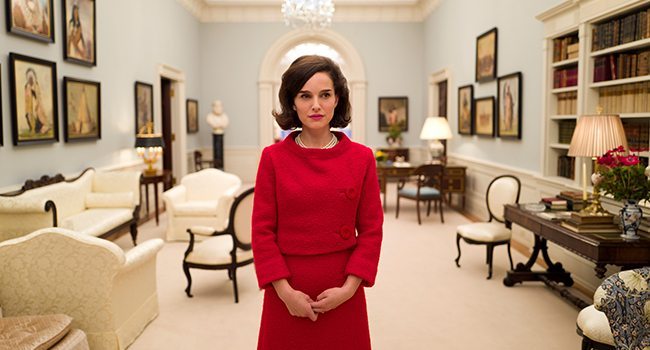Before I saw “Jackie”, I did not know a lot about Jackie Kennedy. After seeing it, I still do not know a lot about Jackie Kennedy. But what I do know is bathed in intricacy, thanks to a magnificent performance from Natalie Portman.
Directed by Chilean filmmaker Pablo Larraín and written by accomplished political journalist Noah Oppenheim, “Jackie” is by definition a biopic — but I don’t think that’s entirely accurate.

Your typical biopic is a film that cinematically spices up a historical figure’s life. “Jackie” is more of a portrait. Biopics are about a life in historical context; “Jackie” is a painting of Jackie Kennedy running with emotional watercolors.
The film follows Jackie at a few key moments in her public and private lives: her televised 1962 tour of the White House, the assassination of her husband the following year, and her illuminating interview with Life Magazine immediately after that. It doesn’t flow chronologically though: the movie attempts to tell all three stories simultaneously.
This structural choice — along with a few other odd stylistic touches (namely in the screenplay and soundtrack) — is distracting, but Natalie Portman and the director’s focus on his subject keep “Jackie” elevated to greatness.
Portman deserves all sorts of awards for her defining turn as Jackie Kennedy. She is astounding in her ability to balance trembling instability and a distinct feminine agency (gender matters here because Mrs. Kennedy’s femininity colored her power and impact). Portman emanates understanding of how the First Lady’s experiences must have fundamentally affected her as a human being.

The accuracy of her portrayal doesn’t seem possible in a world without time machines. “Jackie” will define Natalie Portman’s career.
Billy Crudup and Greta Gerwig fill out the supporting roles with understated work, which is typical of the former and nice to see from the latter.
Director Pablo Larraín’s work is determined. The visual emphasis on both Jackie Kennedy as a subject and the specifics of the events she internalizes is commendable.
“Jackie” never forgets whom it’s about: its cinematography holds you in a vice grip, wrapping you up in the First Lady’s world and letting you live in her eyes until you truly know her.
The structure, screenplay, and soundtrack are not as sound. “Jackie” uses the Life Magazine interview as a framing device for her White House tour, which is a framing device for her relationship with John F. Kennedy, which in turn helps unfold her reaction to his death. Sometimes the framing narratives switch roles; the story of her husband’s death is occasionally chronological.
It’s rather random and infrequently serves to develop ideas in a noticeable order. Add rote dialogue that fails to pull off self-seriousness and a blatant soundtrack that blares out exactly what you’re supposed to feel, and “Jackie” can feel like a puzzle in which some pieces don’t fit alongside the picturesque ones.
But when the puzzle is finished, you’re left with a film fixated on Natalie Portman’s perfect expression of a complicated woman. That alone is worthwhile.
★★★★ (4 out of 5)




